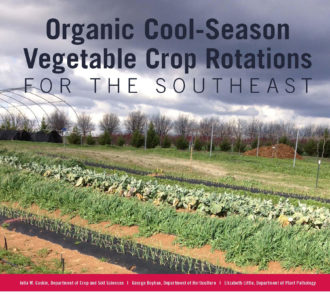ATHENS, Georgia – In the Southeast, where pests, diseases and weed pressures in the summer make organic vegetable production difficult, more efficient productivity and profitability may be found in shifting cash crop production to the fall.
Cool-season vegetable production, combined with warm-season cover crop rotations for soil health, can set growers up for successful production of high-value crops, including many that are traditionally grown as summer crops in other parts of the country. Based on the results of a Southern Sustainable Agriculture Research & Education (SSARE) grant-funded study (LS10-225), “Evaluation of Crop Rotation for High-Value Cool Season Horticultural Crop Production in Organic and Sustainable Systems,” University of Georgia researchers found that such crops as onions, lettuce, broccoli and potatoes, in rotation with warm-season cover crops, were profitable and would be a good fit for mid-scale organic growers.
A new University of Georgia Extension bulletin (No. 1498), written by crop and soil scientist Julia Gaskin, horticulturist George Boyhan, and plant pathologist Elizabeth Little, is now available for growers interested in focusing on cool-season vegetable production. “Organic Cool-season Vegetable Crop Rotations for the Southeast,” discusses organic cool-season vegetable production in conjunction with warm-season cover crop rotations, giving guidance for the proper cash crop/cover crop rotation mix, building soil quality and providing information on proper fertility management.
The publication emphasizes that there may be a niche for mid-scale producers (greater than 5 acres) to develop cool-season rotations that focus on four to eight cash crops along with cover crops to meet the demand for organic vegetables in farmers markets, CSAs, grocery stores, restaurants, and other institutions supplying organic produce.
The bulletin is based on the results of the Southern SARE-funded study. It discusses that cool-season vegetable production offers many advantages, including fewer pest and weed problems, off-season production, and the potential to maintain and increase soil organic matter.
Published by the Southern Region of the Sustainable Agriculture Research and Education (SARE) program. Funded by the USDA National Institute of Food and Agriculture (NIFA), Southern SARE operates under cooperative agreements with the University of Georgia, Fort Valley State University, and the Kerr Center for Sustainable Agriculture to offer competitive grants to advance sustainable agriculture in America's Southern region. This material is based upon work that is supported by the National Institute of Food and Agriculture, U.S. Department of Agriculture, through Southern Sustainable Agriculture Research and Education, under sub-award number: LS10-225. USDA is an equal opportunity employer and service provider. Any opinions, findings, conclusions, or recommendations expressed in this publication are those of the author(s) and do not necessarily reflect the view of the U.S. Department of Agriculture.
